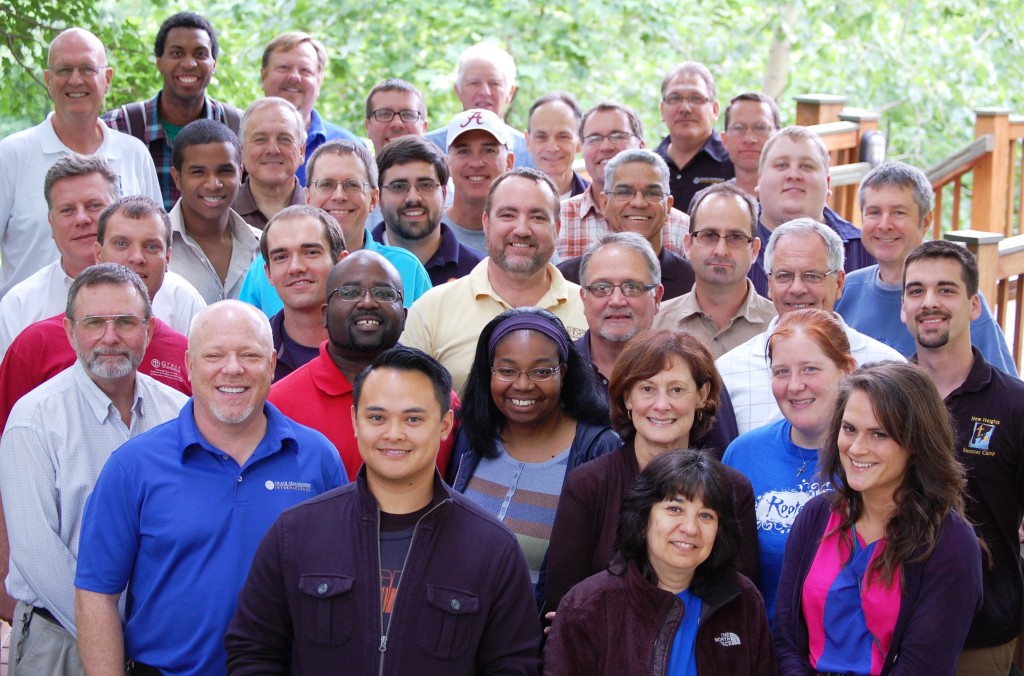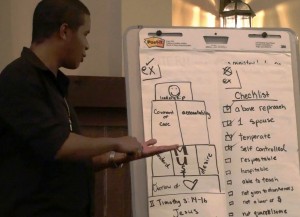Here is the sixth and concluding article in a series by Gary Deddo on interpreting Scripture. For part one, click here; for part two, click here; for part three, click here; for part four, click here; for part five, click here.
Concluding Principles
We now conclude this series with several principles that help us interpret Scripture in ways that honor its God-given nature and purpose.
The Written Form of Biblical Texts
God’s gift comes to us in the form of writings that were preserved down through the ages in the form of written texts in human languages. To honor Scripture is to honor the form in which is it given to us not just the content. Thus to pay careful attention to the Bible, we have to take into consideration its historical, linguistic and literary forms. Our methods have to be able to attune us to the communication offered in those forms. But the methods used to engage the forms of communication cannot be allowed to take over and determine what we are able or are allowed to hear. That’s how modern biblical studies and criticism have often gone wrong. However, we can selectively use methods attuned to the form of Scripture in ways that enable us to hear the words as references to the realities that disclose to us its meaning and significance. Methods that impose their own meanings and significance must be set aside; otherwise we are granting them final authority over Scripture, placing our ultimate trust in them and not in the living Word of God.
What are some implications of recognizing the importance of the form of biblical revelation? First, a knowledge of the biblical languages can be helpful for those translating it into other languages (missionary translators), for those translating it into other historical-cultural contexts (pastors and teachers) and for those who equip others to communicate the biblical message and meaning. A familiarity with the customs, the culture, the time period of history and the original audience addressed at the time the various texts were written is also useful. A grasp of the various literary forms used and how they function as means of communication (e.g. history, wisdom literature, letters, gospels, apocalyptic etc.) also helps us better listen to God’s Word. Much of scholarship is devoted to these elements of biblical studies. There are a number of good books that assist us in discerning the genre of the various biblical writings and how to approach them.
Methods Must Serve the Message and Meaning of the Texts
However, the methods have to always be in service of and subservient to the message and the meaning (realities to which they refer) of the biblical revelation. Whatever methods we use should not: 1) impede our hearing the message or 2) call into question the possibility of actually knowing those realities or 3) impose their own philosophical presuppositions on what we can expect to know or hear before we’ve listened, or 4) draw us into a false sense of objectivity (which promotes a seeming neutrality or abstract distance between us and the object of revelation’s disclosure). Those methods that do so would need to be ruled out, rejected and repented of. For in those cases the methods have become our religion, our primary object of trust, the authoritative source of our most fundamental assumptions about reality. They will, in fact, have become the controlling reality and therefore serve as conceptual idols that make us into users of and lords over the Word of God.
And they may do this all under the cover of our assumed powers that we have and need for “knowing good and evil.” (Just what the serpent tempted Adam and Eve to think they needed.) But such dangers need not rule out a proper use of methods that are ordered to the nature and ends of the good gift of Scripture. We honor the creaturely form of Scripture when our methods correspond to it rather than rule over it. And such methods will pay careful attention to the genre of the various biblical texts as well as the language and historical and cultural background. A resource such as the IVP Bible Background Commentary provides such information to assist anyone on any passage of Scripture.
Whole Literary Units
Another simple implication is that the form of biblical revelation is for the most part conveyed to us as whole literary pieces. The books of the Bible were written, collected and arranged as whole pieces. Thus, harkening back to what we said about interpreting the parts in terms of the whole and the whole as made up of all the parts, we should always consider the whole of the literary unit in which Scripture was written and preserved for us to ascertain the meaning and significance of the various sub-units within.
Individual passages or even chapters should be interpreted in the light of the whole book and the location and order in which each verse, paragraph or section appears in the book. Failing to do so takes the parts out of context and does not honor the coherent form in which God has given and preserved his written word for us. On any topic, every book of the Bible must be taken into consideration along with its particular location in the history of God’s revelation and in relation to its revelatory center in Jesus Christ. But that process must start by studying the biblical books as whole units written or collected and arranged as wholes. In that way we have many pointers, some clearer than others, guiding us to know and properly relate to the realities that God intends them to disclose to us.
Indicatives of Grace are the Foundation for the Imperatives of Grace
I have become alert to another bad habit that somehow has sneaked into our biblical interpretation that could use some corrective attention. We are often under conviction that the Bible is primarily there to tell us what to do for God or how to do certain things for God. This is especially true for those who have already become believing people, members of a church. This pull of being obligated to do things for God becomes so strong that often we are drawn into bad habits of biblical interpretation. We end up not really hearing the Word and inadvertently distort what we hear. We end up thinking God is essentially a taskmaster and we are his slaves or worker-bees!
The problem arises when we take something that is simply declared to us so that we might trust in its truth and reality and then turn it into something we are to do, or accomplish or somehow make actual or real. In shorthand and using the terms of grammar, we turn indicatives of grace into imperatives (commands) of works.
For example, in the Beatitudes in Jesus’ Sermon on the Mount (Matthew 5), we turn the indicatives that tell us that God has blessed certain folks (the poor in spirit, the meek, those who thirst for righteousness and those who are peacemakers) into commands telling us to try harder to become these things. But Jesus was not using imperatives to command his listeners to work harder to do those things or to become those things. Rather, he was indicating what God already has done in blessing his people. God blessed some listening to Jesus right then and there. Jesus was then inviting them (and us!) to recognize and marvel at what God had done by his Spirit in his people.
A little later in the Sermon, Jesus does give a command—he issues an unconditional imperative at the end of the Beatitudes: “Rejoice and be glad!” Yes that’s what we are obligated to do for God! And why? Jesus tells us: because God has blessed his people so that some are meek, some are longing for righteousness, some are peacemakers. God is a blessing God…rejoice and be glad! But when the indicatives of this passage are twisted into imperatives, by the time we get to the actual imperative in the sermon, we’re too burdened down with guilt to even hear Jesus’ command. Or if we do hear, we don’t obey. “Right,” we say, “rejoice and be glad. No way! He can’t be serious after haranguing us like that—disappointed that we’re not doing all that we’re supposed to do.” When we follow that faulty line of reasoning, taking what we think might be the “harder road,” we’ve dismissed the truth of Jesus’ message about the blessings of God and missed the actual response he intends to elicit from us!
The Ten Commandments in Perspective
I could multiply examples where people take a description in Scripture of what God has done or what he can be trusted for and convert that description (indicative) into an obligation or a command (imperative). This mistake comes from our anxiety to do things for God. The supposed commands are seen as conditions for getting God’s approval or his blessing. But as you study Scripture, look to see if it isn’t the case that underneath or behind every command there isn’t some indication of who God is or what God can be trusted for, which supplies the very foundation and motive for those commands that are given. God does not need to be conditioned to be faithful to himself and his promises to us.
Let me give one more example. Let’s go back to the Old Testament to the Ten Commandments given to Israel. Notice that it is not given until 430 years after God established his covenant with Abraham. It amounted to a promise: “I will be your God and you shall be my people.” “Through you all the nations of the earth shall be blessed.” But even Exodus chapter 20 does not begin with “Thou shalt nots.” Note verse two: “I am the Lord your God who brought you out of Egypt, out of the land of slavery.” This verse indicates who God is and what he can be trusted for. It points out that the God who commands is the kind of God who rescues, redeems, sets free, delivers and saves! Why would Israel have an interest in other gods? Did the frog god do such for them? Did the fly god? The Nile River god? The cow god? The sun god? No, all the gods of Egypt became curses and led to death, not life.
As long as Israel trusted their God to be true to his character as revealed and indicated in the great Exodus, they would not even be tempted to turn to these idols, much less make images of them! Who God is in his nature and character is the foundation and the freedom for obeying his commands that follow. When this God is obeyed by faith in his character as revealed in his acts of deliverance, his commands are easy to obey. They are difficult and perhaps impossible to obey only if and when we don’t trust God to be true to his character, the same character we see revealed supremely and in person in Jesus Christ our Ultimate Deliverer.
Look for the Indicatives of Grace Upholding Every Command of Grace
So the simple interpretive rule here is: always interpret the commands of God in terms of indicatives of God’s grace and faithful character. Never grab a command apart from its foundation on the indicatives that reveal and remind us who God is. Whenever you find a command, stop and find the indicative of grace upon which it rests and then interpret them together. It should be somewhere nearby, either before or after the command. It might be the whole first half of the book, like Romans where chapters one through eleven lay out the grace of God and chapters 12-16 present the proper response to that grace. And certainly don’t turn the indicatives of grace into an obligation of works. Doing so violates the form (grammar, in this case) and meaning of the words of Scripture. Don’t let your guilt, fears and anxieties tempt you to turn a truth about God into an obligation to be laid on yourself or others.
Where Do Warnings Come From?
Another bad habit I have run into and been guilty of myself in years past regards how we interpret the warnings in Scripture. For some reason, I don’t know why, when reading the warnings in the Bible many have the habit of thinking that it indicates that God has a mean streak (should I say “spirit”?) and wants the horrible outcome spoken of to come to pass. So we might be tempted to think that Jesus wants and delights in sending away those not prepared for the wedding feast, or that he wants the rich man who mistreated Lazarus to suffer eternally, etc. After reading a warning we often conclude, “See, we knew there was a dark and unforgiving side of God—look at that warning right there in Scripture! He delights just as much in punishing, rejecting and being wrathful as in saving, reconciling and restoring.”
But what is the meaning, the reality of these warnings? How should we interpret them in the context of all of Scripture and in light of the character of God revealed in our Lord and Savior Jesus Christ? First off, warnings are not the first word God gives. Warnings come as the last word offered to those who reject all the other words of promise and blessing that call for complete trust in and worship of God alone. And they are mostly directed at self-righteous and haughty religious people, not those who are unbelieving and not a part of the community of worshippers.
And then, what is the purpose or aim of a warning and why would someone give a warning? The purpose is to prevent the outcome pictured from happening! It is not given to assure that it does happen. It is given because the outcome is not wanted, is not desired but to be averted. It is given to help the very one being warned of the danger. Warnings are a sign of love, not rejection. Perhaps it is the last sign given, but nevertheless still one of love. If God didn’t care or wanted the anticipated negative outcome to occur, there would no reason for him to issue a warning at all. Why even bother! But, no, warnings are the last words of love to prevent the potential outcome.
Other biblical teaching tells us that God does not delight in the punishment of the wicked (Ezekiel 33:11) and he wants no one to perish but to turn and repent (2 Peter 3:9). Jesus’ own explanation that he came not to condemn the world but to save it (John 3:14-18) backs up this understanding of biblical warnings. We have Scripture that tells us in no uncertain terms how God regards the unbeliever, the unrepentant ones. God does not take delight in seeing his good creation come to ruin. Warnings are expressions of love when nothing else has worked. They are not threats God can’t wait to carry out. So we ought to interpret biblical warnings in terms of the character of God shown in Christ and according to the purpose of warnings meant to prevent the potential disastrous outcome to those God loves.
Interpret Deeds in the Light of the Interpretive Words
And finally one last bad habit of interpretation to consider. In listening to and studying Scripture we can fall into the trap of interpreting an action of God or of God’s people apart from the accompanying words that indicate its meaning. The revelation of God involves a Word-Deed event. Certainly, God does things and has his people do certain things. But the deeds cannot be understood apart from the word given that interprets it. Deeds do not interpret themselves.
The significance and meaning of a particular deed is revealed through words that explain what was behind that action. But often we read of God doing something, especially in the Old Testament but sometimes in the New, and immediately react and draw conclusions about what that deed must say about God or his purposes or mind. For example, we read that the Egyptians drowned in the Red Sea or that God hardened Pharaoh’s heart. Or we read of Jesus driving out the money-changers from the temple, or cursing the fig tree, or warning those who have not repented, or instructing the disciples to shake the dust off their feet from those villages that refuse to welcome them. Instead of looking for the prophetic and apostolic interpretation of these deeds—seeking to understand what they point to and how they are fulfilled and perfected (brought to their right and true end or purpose)—we interpret them in the context of what we might mean if we were to do these things today (or perhaps what the worst and meanest person we can think of might mean by it!).
In making this mistake, we are substituting our imagined context for the biblical context and explanation. Although sometimes it’s not obvious in every text, when the whole picture is assembled we find that the ultimate purpose of the text is redemption, reconciliation, deliverance—the salvation that is fulfilled in Jesus. Deciding on what a deed of God or his people means apart from God’s character and words that interpret such deeds is another way of taking Scripture out of context—it is the grasping of an individual part that is disconnected from the whole. Deeds must never be understood apart from their revealed explanations.
While there are other words surrounding and interpreting for us those deeds mentioned above, I want to conclude by reminding us that Jesus Christ himself is the final Deed and Word of God. Jesus had to interpret his deeds even to his own disciples for them to know what they meant. This is especially true of the saving significance of his death and the hope of the resurrection. Without hearing his spoken words we would not know the meaning of his actions. Both must be taken together.
Jesus, God’s Final Word and Deed
In fact, all the deeds of God in the Bible and other prophetic words should be interpreted in terms of who Jesus is, the Final Word-Deed. The Exodus and Pharaoh must be interpreted in terms of Jesus and his revelation of the heart and mind of God toward all his human creatures. He embodies and explains his very purpose to save. As the Son of God and the Son of Man he worked out that purpose by assuming our human nature as the second Adam and becoming the new head of the race.
So even Jesus’ own deeds must be interpreted in terms of his own words, not in terms of our own words/thoughts/imaginations. In other words, all his deeds or work must be interpreted in the light of his person—in the light of who Jesus is. Said another way, we must interpret his works in terms of his person. And who is Jesus in his being and nature? He is the Son of the Father, our Savior, Redeemer and Reconciler. That’s what the name Jesus means—the name given to him by his heavenly Father. All of Jesus’ deeds indicate who he is as the eternal Son of the Father, become our Brother, Lord and Servant King in order to make us his beloved children. As God’s final word and deed, Jesus is the key to interpreting every word and deed in Scripture—the written word belongs to Jesus and comes from him, God’s Living Word to us.
This is exactly what was occurring when Jesus stayed with those he met on the road to Emmaus following his resurrection: “And beginning with Moses and all the Prophets, he interpreted to them in all the Scriptures the things concerning himself” (Luke 24:27 ESV). You’ll also recall Jesus’ admonition to the Pharisees: “You search the Scriptures because you think that in them you have eternal life; and it is they that bear witness about me; yet you refuse to come to me that you may have life” (John 5:39-40 ESV).
Interpretation of Scripture is the Church’s Responsibility
There is one last word to consider before we end this series. The task of interpreting Scripture is not the responsibility of isolated individuals but the task of the whole church, involving its various members with their gifts and callings, including those gifted as teachers and preachers. Proper interpretation of Scripture takes account of how particular passages of Scripture have been understood by many down through the history of the church and into our own times. We’ll want to pay more attention to those teachers and interpreters who follow the kind of guidelines we have laid out in this series.
In presenting this series, I am indebted to many who have gone before me. I have not footnoted these references, but I could have. It is good to consult others before we make final determinations of what a given passage of Scripture means or what a collection of Scriptures add up to mean. We should look for precedents—paying attention to those who have been called by God to assist the church in listening to and understanding Scripture. We ought to be skeptical about esoteric interpretations that have little or no continuity with what the orthodox church as a whole has historically understood. This does not mean that deeper understanding could not be obtained as we stand on the shoulders of those who have gone before. But that understanding should be deeper and fuller than what has gone before, not a departure or wholesale discount of it.
God has many laborers working by faith to understand Scripture. We must not be so arrogant as to think that we alone, individually, can have an independent and final say. While the approach advocated in this series will not guarantee uniformity of interpretation throughout the church, it will help us avoid falling into traps, especially those already identified centuries ago! God gives his Word and his Spirit to the Church as a whole. We must not despise others who approach it with the same honor with which we regard it, for in doing so we would be rejecting some of the good gifts that God has given to the church in the past for our benefit today.
With those words then, I end this series with the hope that more questions have been answered than raised; more light shed than heat generated.
May the Lord himself sanctify all these words to you. Amen.
 The 1940s were a time of great growth for evangelical churches. Our own denomination, then known as the Radio Church of God, was no exception. As more and more people responded to Herbert Armstrong’s broadcasts and personal campaigns, small groups would form. But with no one to pastor them, they soon disbanded. In his Autobiography, Mr. Armstrong explained how he noticed that several other small churches had resolved this problem by starting training colleges. And so, in 1947, Ambassador College in Pasadena opened. Later, sister campuses opened in England and Texas.
The 1940s were a time of great growth for evangelical churches. Our own denomination, then known as the Radio Church of God, was no exception. As more and more people responded to Herbert Armstrong’s broadcasts and personal campaigns, small groups would form. But with no one to pastor them, they soon disbanded. In his Autobiography, Mr. Armstrong explained how he noticed that several other small churches had resolved this problem by starting training colleges. And so, in 1947, Ambassador College in Pasadena opened. Later, sister campuses opened in England and Texas.












